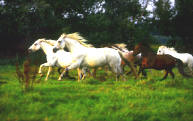 Legend has it that the Connemara Pony descended from Spanish horses, rescued from the Armada when the ships wrecked on the rocky coast of western Ireland in 1568. In fact, the Connemara’s ancestors lived in Ireland for thousands of years, although some of the Armada's horses may have mated with local stock. It is certain that Thoroughbred and Arabian blood was introduced in the 1700's. By the 1920's the breed was threatened by random breeding and the Connemara Pony Breeders Society was formed to preserve the purity of the breed. A key to the excellence of the Connemara Pony is the hardy environment in which it lives. Turned out to survive the harsh weather on rough pasture, only the strong of the breed survive.
Legend has it that the Connemara Pony descended from Spanish horses, rescued from the Armada when the ships wrecked on the rocky coast of western Ireland in 1568. In fact, the Connemara’s ancestors lived in Ireland for thousands of years, although some of the Armada's horses may have mated with local stock. It is certain that Thoroughbred and Arabian blood was introduced in the 1700's. By the 1920's the breed was threatened by random breeding and the Connemara Pony Breeders Society was formed to preserve the purity of the breed. A key to the excellence of the Connemara Pony is the hardy environment in which it lives. Turned out to survive the harsh weather on rough pasture, only the strong of the breed survive.
The body of the Connemara is compact and deep, yet not bulky. It has legs which are short, clean, and have ample bone; the shoulders are rounded. The Connemara has a handsome head, the neck fairly lean, and it has abundant mane and tail. The Connemara stands between 12.2 and 14.2 hands. In spite of its relatively small size, the Connemara is known as an excellent hunter and jumper, and it competes in such varying events as distance riding and dressage. The Connemara was originally dun in coloring, but this color is now rare. It is most frequently found gray, but also in black, bay, and brown.
Origin
The Connemara is a member of that group of equids known as mountain and moorland ponies. It originated in Connemara, county Galway in western Ireland. Arab and Spanish blood have been introduced to refine the breed. But the Connemara, in turn, was used to influence the fine Irish hunter.
 The Connemara's Survival
The Connemara's Survival
By the beginning of this century, the purity of the Connemara was threatened by the random cross-breeding with other breeds of horses. Also, many Connemaras were being kept in stables and hence inferior examples survived. In the 1920's, a group of owners chose a dozen quality ponies and turned them out into the wilds to live and reproduce. Those that survived had excellent qualities, and they preserved the stamina and purity of the breed.